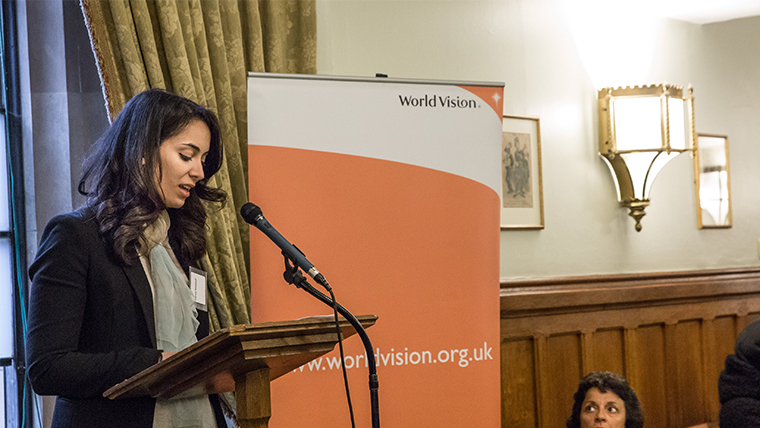Syria 5 years on: Children paying the cost of war
By Sana'a Maalouf, Advocacy Manager, World Vision Lebanon
The lives of more than eight million Syrian children have been disrupted since the conflict unexpectedly started in Syria five years ago. Millions have been displaced and thousands have lost their lives.
What these children have faced cannot be measured or imagined. They have lost fathers, mothers, brothers, sisters and friends. They also lost homes, dreams, the joy of play and an education. It is no exaggeration to say that they have lost their childhoods.
Five years ago, I had just started my journey with World Vision Lebanon. When Syrians started leaving their country and entering Lebanon seeking refuge, they were initially hosted by Lebanese families in their homes and supported by local communities. At the time, we mobilized our existing staff and resources to support them; it was the beginning of our Syrian refugee crisis response.
Today, a large percentage of refugees are living in tents, enduring harsh cold winters in high altitude areas of Lebanon. With the deteriorating economic situation, high living costs, limited employment opportunities and restrictions on work and movement, Syrian refugees are left with desperate choices in order to meet their basic needs. Parents are forced to send their children to work, or marry off their girls in order to provide some level of safety and ease the economic burden on their family. We are seeing children as young as four years old working. Girls who should be in school are now wives; some have even become mothers.
It is heart breaking and painful to witness on a daily basis. I cannot but think - what if it was my baby boy living in these circumstances? I cannot express how difficult it must be for these children and their parents, especially the mothers who have to send their children to beg on the streets or marry their girls off at a very young age. As a mother, I cannot envision anything harder than not being able to provide for the needs and dreams of my child.
We see thousands of children scattered across the country working more than eight hours a day, in construction, mechanics, agriculture, some very late in the evening selling roses next to restaurants in cities, or waiting beside busy roads to sell bottles of water to passing motorists. All are missing out on an education and their childhoods. I worry that the impact of the discrimination, abuse and deprivation these children experience may become irreversible unless we intervene.
We are all witnesses to this injustice and we are all called on to take whatever actions we can. In Lebanon, we are providing early childhood education programmes and child friendly spaces for children. To help give the families a bit of dignity, we also provide cash assistance for food and basics, and winter survival kits for the most vulnerable.
Access to water is a big challenge for refugees, and the influx has placed public health and sanitation services under stress. We are working with local actors to improve access to water, wastewater disposal and municipal waste collection for both host and refugee communities.
However, only 5% of the funding required for the overall response in Lebanon in 2016 has been committed so far. We need to invest in the future of children in Syria and Lebanon and other nearby countries.
The UK government has taken a very bold and generous step by pledging over £2.3 billion at the 2016 London Conference for Syria last month. However, financial support – although crucial – is not enough. The UK government and all developed countries also need to increase their resettlement programmes and provide asylum options for families in need of protection. The pledges have been made, but they must be followed through.
I was very excited to talk about the true extent of the conflict and its impact in the unique event that my colleagues at World Vision UK had organised at the UK parliament last week. As a Lebanese citizen, it was interesting to hear UK citizens and parliamentarians passionately discuss a humanitarian cause, even though the crisis has not had a direct impact on them.
I was overwhelmed by the genuine support and care of all those who attended and I thank them on behalf of all of the children who think that they have been forgotten. It is my prayer that this would be the last year that we mark yet another year of the Syrian Crisis.
World Vision has reached over 2.37 million people affected by the Syria crisis since 2011. In our recent Cost of Conflict report we estimated that Syrian children had lost a total of 25 millions hours of education over the past 5 years. In Lebanon, we are working to provide food aid, remedial education and implementing hygiene & sanitation for those who are in need. You can read more about how you can help by giving to our Syrian Crisis Response here »
